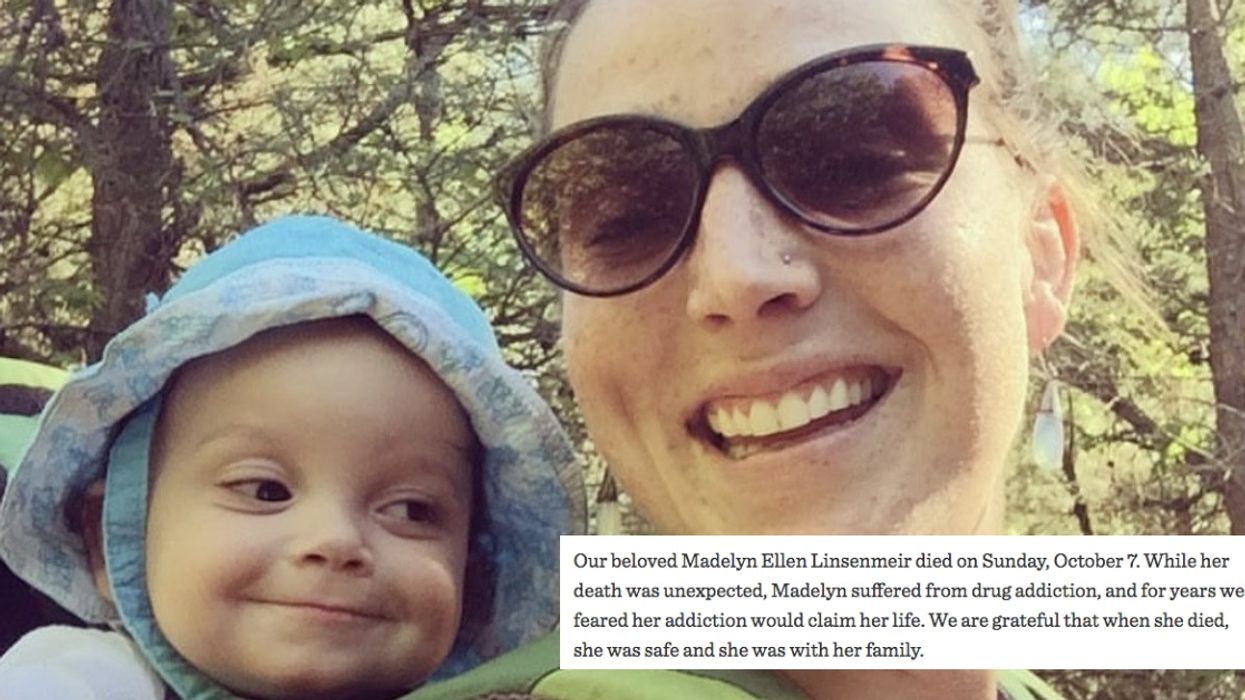A grieving Vermont family is going viral for bravely doing what so many could never (and should never have to) do: candidly using their daughter's death to shed light on the social issue that contributed to her passing.
Madelyn Linsenmeir of Burlington, Vermont recently passed away at just 30 years of age from an issue that has seemingly been all but forgotten since its moment in the sun during the 2016 election: opioid addiction.
The incredibly brave candor Madelyn's family shows in her obituary is striking, and it quickly went viral since its posting in Seven Days Vermont on Sunday.
Whereas addiction is often spoken of in hushed tones, if at all, in our society, Madelyn's family goes into detail about how her addiction began, how it grew to consume her life and those of the people closest to her, and ultimately how it brought about Madelyn's passing.
The obituary tells of how Madelyn's addiction began after trying OxyContin at a party at a new high school to which she relocated in Florida, in order to study the performing arts.
"[S]o began a relationship with opiates that would dominate the rest of her life," the obituary reads.
It goes on to characterize Madelyn as a brilliant artist whose identity was often subsumed by her addiction in the eyes of those who encountered her:
"It is impossible to capture a person in an obituary, and especially someone whose adult life was largely defined by drug addiction. To some, Maddie was just a junkie — when they saw her addiction, they stopped seeing her. And what a loss for them. Because Maddie was hilarious, and warm, and fearless, and resilient. She could and would talk to anyone, and when you were in her company you wanted to stay. In a system that seems to have hardened itself against addicts and is failing them every day, she befriended and delighted cops, social workers, public defenders and doctors, who advocated for and believed in her 'til the end. She was adored as a daughter, sister, niece, cousin, friend and mother, and being loved by Madelyn was a constantly astonishing gift."
Later in her life, Madelyn gave birth to a son, Ayden, in 2014, and "transformed her life to mother him."
"After having Ayden, Maddie tried harder and more relentlessly to stay sober than we have ever seen anyone try at anything. But she relapsed and ultimately lost custody of her son, a loss that was unbearable."
The family closes the obituary with a call to action to support the services of Turning Point Center, where Maddie was treated, and some unsparing words for a society and system that all too often greets addicts with scorn:
"If you are reading this with judgment, educate yourself about this disease... It is not a choice or a weakness... If you work in one of the many institutions through which addicts often pass — rehabs, hospitals, jails, courts — and treat them with the compassion and respect they deserve, thank you. If instead you see a junkie or thief or liar in front of you rather than a human being in need of help, consider a new profession."
On social media, people were blown away by the family's openness, and their strength in addressing this heartbreaking issue in the immediate wake of their loved one's passing:
The current US opioid crisis--fueled by the prescription drugs fentanyl and oxycodone, as well as heroin--continues worsening each year. According to the National Institute on Drug Abuse, 2017 saw 72,000 drug overdose deaths, with a drastic increase of 30,000 deaths related to prescription drugs "fentanyl and fentanyl analogs (synthetic opioids)."
While the Trump administration has declared a commitment to addressing the opioid crisis, experts in the field of addiction, as well as his political opponents, have found the government's response severely lacking.
You can register to vote for candidates in support of addressing the opioid crisis in the upcoming November 6 midterm elections here.














 @DuncanCecil/X
@DuncanCecil/X @@realDonaldTrump/Truth Social
@@realDonaldTrump/Truth Social @89toothdoc/X
@89toothdoc/X @xray_media/X
@xray_media/X @CHRISTI12512382/X
@CHRISTI12512382/X
 @sza/Instagram
@sza/Instagram @laylanelli/Instagram
@laylanelli/Instagram @itssharisma/Instagram
@itssharisma/Instagram @k8ydid99/Instagram
@k8ydid99/Instagram @8thhousepath/Instagram
@8thhousepath/Instagram @solflwers/Instagram
@solflwers/Instagram @msrosemarienyc/Instagram
@msrosemarienyc/Instagram @afropuff1/Instagram
@afropuff1/Instagram @jamelahjaye/Instagram
@jamelahjaye/Instagram @razmatazmazzz/Instagram
@razmatazmazzz/Instagram @sinead_catherine_/Instagram
@sinead_catherine_/Instagram @popscxii/Instagram
@popscxii/Instagram
